Download
01 - A Church, A Courtroom And Then Goodbye
02 - A Poor Man's Roses
03 - Cry Not For Me
04 - Fingerprints
05 - Got A Lot Of Rhythm In My Soul
06 - Honky Tonk Merry Go Round
07 - Hidin' Out
08 - I Cried All The Way To The Altar
09 - I've Loved And Lost Again
10 - I Can't Forget
11 - In Care Of The Blues
12 - Just Out Of Reach
13 - Let The Teardrops Fall
14 - Never No More
15 - Stop The World And Let Me Off
16 - Today, Tomorrow And Forever
17 - Turn The Cards Slowly
18 - Too Many Secrets
19 - Three Cigarettes In An Ashtray
20 - Walkin' After Midnight
Patsy Cline (September 8, 1932 – March 5, 1963), born Virginia Patterson Hensley, was an American country music singer who enjoyed pop music crossover success during the era of the Nashville sound in the early 1960s. Since her death at age 30 in a 1963 plane crash at the height of her career, she has been considered one of the most influential, successful, revered, and acclaimed female vocalists of the 20th century.
Cline was best known for her rich tone and emotionally expressive bold contralto voice, which, along with her role as a mover and shaker in the country music industry, has been cited and praised as an inspiration by many vocalists of various music genres. The story of her life and career has been the subject of numerous books, movies, documentaries, articles and stage plays.
Posthumously, millions of her albums have been sold over the past 46 years and she has been given numerous awards, which has given her an iconic status with some fans similar to that of legends Johnny Cash and Elvis Presley. Only ten years after her death, she became the first female solo artist inducted to the Country Music Hall of Fame. In 2002, she was voted by artists and members of the country music industry as number one on CMT's television special of the 40 Greatest Women of Country Music, and in 1999 she was voted number 11 on VH1's special The 100 Greatest Women in Rock and Roll by members and artists of the rock industry. According to her 1973 Country Music Hall of Fame plaque, "Her heritage of timeless recordings is testimony to her artistic capacity." Among those hits are "Walkin' After Midnight," "I Fall to Pieces," "She's Got You," "Crazy" and "Sweet Dreams."
Cline was best known for her rich tone and emotionally expressive bold contralto voice, which, along with her role as a mover and shaker in the country music industry, has been cited and praised as an inspiration by many vocalists of various music genres. The story of her life and career has been the subject of numerous books, movies, documentaries, articles and stage plays.
Posthumously, millions of her albums have been sold over the past 46 years and she has been given numerous awards, which has given her an iconic status with some fans similar to that of legends Johnny Cash and Elvis Presley. Only ten years after her death, she became the first female solo artist inducted to the Country Music Hall of Fame. In 2002, she was voted by artists and members of the country music industry as number one on CMT's television special of the 40 Greatest Women of Country Music, and in 1999 she was voted number 11 on VH1's special The 100 Greatest Women in Rock and Roll by members and artists of the rock industry. According to her 1973 Country Music Hall of Fame plaque, "Her heritage of timeless recordings is testimony to her artistic capacity." Among those hits are "Walkin' After Midnight," "I Fall to Pieces," "She's Got You," "Crazy" and "Sweet Dreams."
Born September 8, 1932, in Winchester, Virginia, she was the daughter of Sam and Hilda Patterson Hensley, a blacksmith and a seamstress; Hilda was only 16 when Patsy was born. Patsy was the eldest of three children, the others being Samuel and Sylvia. The three children, despite their given names, were called "Ginny," "John" and "Sis", respectively. Patsy grew up a poor girl "on the wrong side of the tracks," but except for the fact that her father deserted the family in 1947, when she was 15, the Hensley home was quite happy.
The family lived in many different places around Virginia, before settling in Winchester. Cline often said as a child that she would one day be famous, and admired stars such as Judy Garland and Shirley Temple. A serious illness as a child caused a throat infection which, according to Cline, resulted in her gift of "a voice that boomed like Kate Smith's." Well-rounded in her musical tastes, Cline cited everyone from Kay Starr to Hank Williams as influences. As a child, she often sang in church with her mother. Cline was also a by-ear pianist who sang with perfect pitch.
The family lived in many different places around Virginia, before settling in Winchester. Cline often said as a child that she would one day be famous, and admired stars such as Judy Garland and Shirley Temple. A serious illness as a child caused a throat infection which, according to Cline, resulted in her gift of "a voice that boomed like Kate Smith's." Well-rounded in her musical tastes, Cline cited everyone from Kay Starr to Hank Williams as influences. As a child, she often sang in church with her mother. Cline was also a by-ear pianist who sang with perfect pitch.
Cline began performing in area variety/talent showcases. She went to the local radio station (WINC-AM) in Winchester and asked DJ Jimmy McCoy if he would let her sing on his radio show. He did, which was a great opportunity for Patsy, as McCoy's radio show was a great showcase for local talent. As she grew older, she began to play in popular nightclubs.
To help support her family after her father abandoned them, she dropped out of high school and worked various jobs, soda jerking and waitressing by day at The Triangle Diner across the street from her high school, (John Handley High School). At night, Cline could be found singing at local nightclubs, wearing her famous fringed Western stage outfits she designed herself and which were made by her mother, Hilda.
To help support her family after her father abandoned them, she dropped out of high school and worked various jobs, soda jerking and waitressing by day at The Triangle Diner across the street from her high school, (John Handley High School). At night, Cline could be found singing at local nightclubs, wearing her famous fringed Western stage outfits she designed herself and which were made by her mother, Hilda.
During this period in her early 20s, Cline met two men who would provide early influence in her rise to stardom. The first was contractor Gerald Cline, whom she married in 1953 and divorced in 1957. The dissolution of the marriage was blamed not only on a considerable age difference, but also Patsy's desire to sing professionally and Gerald Cline's lack of support of Patsy's quest for stardom. While she dreamed of a career as a superstar, he wanted her to conform to the role of a housewife first. The second was Bill Peer, her new manager, who gave her the name "Patsy", from her middle name and her mother's maiden name, "Patterson".
Cline began making numerous appearances on local radio, and she attracted a large following in the Virginia/Maryland area — especially when Jimmy Dean learned of her. She became a regular on Connie B. Gay's Town and Country television show, broadcast out of Washington, D.C, which also featured Dean, himself an established young country star. She also began making appearances at the Grand Ole Opry.
Cline began making numerous appearances on local radio, and she attracted a large following in the Virginia/Maryland area — especially when Jimmy Dean learned of her. She became a regular on Connie B. Gay's Town and Country television show, broadcast out of Washington, D.C, which also featured Dean, himself an established young country star. She also began making appearances at the Grand Ole Opry.
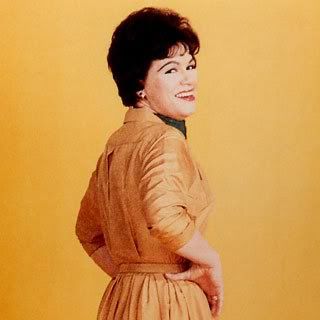
In 1955, Cline was signed to Four Star Records. However, her contract only allowed her to record compositions by Four Star writers; Cline disliked this, and later expressed regret over signing with the label. Her first record for Four Star was "A Church, A Courtroom & Then Good-Bye," which attracted little attention, although it did lead to several appearances on the Grand Ole Opry. Between 1955 and 1957, Cline recorded honky tonk material, with songs like "Fingerprints," "Pick Me Up On Your Way Down," "Don't Ever Leave Me Again," and "A Stranger In My Arms," the latter two both co-written by Cline, and also experimented with rockabilly. None of these songs, however, gained any notable success.
According to Owen Bradley, her Decca Records producer, the Four Star compositions only seemed to hint at the potential that lurked inside of Cline. Bradley thought her voice was best suited for singing pop music. However, the Four Star producers insisted that Cline would record only country songs, as her contract also stated. During her contract with Four Star, Cline recorded 51 songs.
Cline made her network TV debut on January 7, 1956 on ABC-TV's Grand Ole Opry; followed by an appearance on the network's Ozark Jubilee later that month, returning in April.
The year 1957 was a year of great change in Cline's life which made her undoubtably one of the greatest country and western singers of the 1950's. as she found national stardom and she met Charlie Dick. Dick was a good-looking, well-known ladies' man who frequented the local club circuit Cline played on weekends. His charismatic personality and admiration of Cline's talents captured her attention. Their relationship resulted in a marriage that would last the rest of Cline's lifetime. Though their dramatic love affair has long been publicized as controversial, it was he whom Cline regarded as "the love of her life."
While looking for material for her first album Patsy Cline, a song appeared titled "Walkin' After Midnight", written by Don Hecht and Alan Block. Cline initially did not like the song because it was, according to her, "just a little old pop song." However, the song's writers and record label insisted she should record it.
She auditioned for Arthur Godfrey's Talent Scouts in New York City, and was accepted to sing on the CBS-TV show on January 21, 1957. Godfrey's "discovery" of Cline was typical. Her scout, actually her mother Hilda Hensley, presented Patsy who sang her recent release, "Walkin' After Midnight". Though heralded as a country song, recorded in Nashville, Godfrey's staff insisted Cline not wear one of her mother's hand crafted cowgirl outfits but appear in a cocktail dress.
The audience's ovations stopped the meter at its apex, and for a couple of months thereafter Cline appeared regularly on Godfrey's radio program. Initially, Cline was supposed to sing the song "A Poor Man's Roses (Or a Rich Man's Gold)"; however, the show's producers insisted Cline instead sing "Walkin' After Midnight". That night, she won the competition and was invited to return. The song was so well-liked by the audience that she decided to release "Walkin' After Midnight" as a single. In short, although Cline had been performing for nearly a decade and had been recording and appearing on local Washington, D.C. TV for more than two years, Godfrey was responsible for making Cline a star.
The song was released in early 1957, and before long it was a hit, reaching #2 on the country charts and #12 on the pop charts. Cline became one of the first country singers to have a crossover pop hit. Cline rode high on the hit for the next year, doing personal appearances and performing regularly on Godfrey’s show and on Ozark Jubilee (later Jubilee USA). She couldn't follow up "Walkin' After Midnight" with another hit, however, in part because of the deal with Four Star that limited her to songs from its publishing company. After the birth of their daughter, Julie, in 1958, Patsy and Charlie moved to Nashville, Tennessee.
In 1959, Cline met Randy Hughes, who became her manager. With Randy's promotion and a new contract with Decca Records-Nashville, Cline would begin her ascent to the top.
When her Four Star contract expired in 1960, Cline signed with Decca Records-Nashville, under the direction of legendary producer Owen Bradley. He was not only responsible for much of the success behind Cline's recording career, but also for the careers of Brenda Lee and Loretta Lynn.
Thanks to her vocal versatility, and with the help of Bradley's direction and arrangements, Cline enjoyed both country and pop success. Bradley's arrangements incorporated strings and other instruments not typical of country recordings of the day. He considered Cline's voice best-suited for country pop-crossover songs, and helped smooth her voice into the silky, torch song style for which she is famous. Nevertheless, she did not really enjoy singing pop material. This new, more sophisticated instrumental style became known as “The Nashville Sound,“ founded by Bradley and RCA’s Chet Atkins, who produced Jim Reeves, Skeeter Davis, Connie Smith, and Eddy Arnold.
Cline's first Decca release was the country pop ballad "I Fall to Pieces" (1961), written by Hank Cochran and Harlan Howard. The song was promoted at both country and pop music stations across the country, leading to success on both country and pop charts. The song slowly climbed up the charts, until it officially hit No. 1 on the country charts — Cline's first No. 1. The song also made No. 12 on the pop charts, as well as No. 6 on the adult contemporary charts, a major feat for any country singer at the time, especially a woman. The song made her a household name, and proved that a woman country singer could enjoy as much crossover success as a man.
In 1961, Cline also joined the cast of the Grand Ole Opry, realizing a lifelong dream. She became one of the Opry's greatest stars, and is believed to be the only person granted Opry membership merely by asking for it.
Believing that there was "room enough for everybody", and confident of her abilities and appeal, Cline befriended and encouraged a number of women when they were starting out in country music, including Loretta Lynn, Dottie West, Barbara Mandrell (with whom Cline once toured), Jan Howard, and Brenda Lee, all of whom cite her as an influence in their careers. According to Lynn and West, Cline always gave of herself to her friends, buying them groceries and new furniture when they were hard up. On occasion, she would even pay their rent, enabling them to stay in Nashville and continue their quest for stardom. In Ellis Nassour's 1980 biography Patsy Cline, Cline's friend, honky tonk pianist and Opry star Del Wood, was quoted as follows: "Even when she didn't have it, she'd spend it — and not always on herself. She'd give anyone the skirt off her backside if they needed it."
Cline also befriended Roger Miller, Hank Cochran, Faron Young, Ferlin Husky, Harlan Howard, and Carl Perkins, male artists and songwriters with whom she socialized at Tootsies Orchid Lounge, next door to the Grand Ole Opry. In the 1986 documentary The Real Patsy Cline, singer George Riddle said of her, "It wasn't unusual for her to sit down and have a beer and tell a joke. She'd never be offended at the guys' jokes, because most of the time she'd tell a joke better than you! Patsy was full of life, as I remember".
Cline used the term of endearment "Hoss" to refer to her friends, and referred to herself as "The Cline." Though she never met Elvis Presley, she admired his music, called him "The Big Hoss", and recorded with his male vocal backup group, the Jordanaires.
While Cline would continue to thrive in 1961, she also gave birth to a son, Randy. However, on June 14, 1961, Patsy and her brother, Sam, were involved in a head-on car collision on Old Hickory Boulevard in Nashville, the second and more serious of two during her lifetime. The impact of the accident threw Patsy into the windshield, nearly killing her. Upon her arrival at the scene, singer Dottie West picked glass from Patsy's hair, while Patsy insisted that the other car's driver be treated first (when West was fatally injured in a car accident in 1991, she insisted that the driver of her car be treated first ). Patsy later stated that she saw the female driver of the other car die before her eyes at the hospital.
Suffering from a jagged cut across her forehead that required stitches, a broken wrist, and a dislocated hip, she spent a month hospitalized. While in the hospital, Cline, according to the Nassour biography Patsy Cline and to friend Billy Walker (who died in a vehicle accident of his own in 2006), rededicated her life to Christianity. She received thousands of cards and flowers sent by fans.
When she left the hospital, her forehead was still visibly scarred. For the remainder of her career, she wore wigs and careful makeup to hide the scars and headbands to relieve pressure on her forehead. She returned to the road on crutches, determined to be a survivor with a new appreciation for life.
Years later in the 1990s, a series of recordings from her first concert since the accident was released. These archives, recorded in Tulsa, Oklahoma, were found in the attic of one of Cline's former residences by the current owners and given to the family. The album, released in 1997, is titled Patsy Cline: Live At the Cimarron Ballroom, and features dialogue of Cline interacting with the audience, thus giving an historical archive of what her live performances were like.
After the success of "I Fall to Pieces", Cline needed a follow-up, particularly because the car accident had required that she spend a month in the hospital, which meant lost time from touring and promotions. The famous follow-up to her hit was written by Willie Nelson and called "Crazy", which Cline originally hated. Her first session recording "Crazy" turned out to be a disaster, and Cline claimed that the song was too difficult to sing. She tried to record "Crazy" like its demo recording, which featured Nelson's idyosyncratic singing, but had a tough time recording it not only because of its demo, but because she found the high notes hard to sing due to her injured ribs from her car accident. The entire day in the studio at Decca was a head-on fight between Cline and Owen Bradley.
However, Cline finally recorded the song the next week in one take, a version completely different from the demo. Because of this, it turned out to become a classic and, ultimately, Cline's signature song – the one for which she remains best known. In late 1961, the song was an immediate country pop crossover hit, and was also her biggest pop hit, making the Top 10. Friend Loretta Lynn later reported that the night Cline premiered "Crazy" at the Grand Ole Opry, she received three standing ovations.
"Crazy" was a hit on three different charts in late 1961 and early 1962 — the Hot Country Songs list (No. 2), the US Hot 100 list (No. 9), and the Adult Contemporary list (also No. 2). An album released that November entitled Patsy Cline Showcase featured Cline's two big hits of 1961. The album brought success to Cline late that year...
* As stated in the 1980 Ellis Nassour biography, Patsy Cline, friends Dottie West and June Carter Cash both recalled Cline telling them that she felt a sense of impending doom and didn't expect to live much longer in the months leading up to her death. Cline also told Loretta Lynn of this, along with Cash and West, as early as September 1962. Cline, though known for her extreme generosity, even began giving away personal items to friends, writing out her own last will on Delta Air Lines stationery and asking close friends to care for her children if anything should happen to her. She reportedly told Jordanaire back up singer Ray Walker as she exited the Grand Ole Opry a week before her death: "Honey, I've had two bad ones (accidents). The third one will either be a charm or it'll kill me."
On March 3, 1963, Patsy, though ill with the flu, gave a performance at a benefit show at the Soldiers and Sailors Memorial Hall, Kansas City, Kansas, for the family of a disc jockey, Cactus Jack Call, who had recently died in an automobile accident. Also performing on the show were George Jones, George Riddle and The Jones Boys, Billy Walker, Dottie West, Cowboy Copas, Hawkshaw Hawkins, Wilma Lee and Stoney Cooper, and George McCormick and the Clinch Mountain Clan. Cline wore a white chiffon gown and closed the show with her performance to a thunderous ovation. Her last song was the last one she recorded during her last sessions the previous month, "I'll Sail My Ship Alone."
Dottie West, wary of Cline flying, pleaded with her to ride back in the car with her and her husband, Bill. Cline, anxious to get home to her children, refused West's offer, saying, "Don't worry about me, Hoss. When it's my time to go, it's my time." She called her mother from the airport and then boarded a Piper Comanche bound for Nashville, flown by her manager Randy Hughes, along with Cowboy Copas and Hawkshaw Hawkins. After stopping to refuel in Dyersburg, Tennessee, the plane took off at 6:07 pm. According to revelations by the airfield manager in the Nassour biography, he suggested that they stay the night after advising of high winds and inclement weather on the flight path, but Hughes responded, "I've already come this far. We'll be there before you know it."
However, they never made it to Nashville. The plane flew into severe weather and crashed at 6:20 p.m., according to Patsy's wristwatch, in a forest outside of Camden, Tennessee, 90 miles from the destination. There were no survivors.
Throughout the night, reports of the missing plane flooded the radio airwaves. Roger Miller told Patsy Cline author Ellis Nassour that he and a friend went searching for survivors in the early hours of the morning: "As fast as I could, I ran through the woods screaming their names — through the brush and the trees, and I came up over this little rise, oh, my God, there they were. It was ghastly. The plane had crashed nose down."
Not long after the bodies of the victims were removed, scavengers came to take what they could of the stars' personal belongings and pieces of the plane. Many of these items were later donated to The Country Music Hall of Fame; the white chiffon dress that Patsy had worn for her last concert was never found.
As per her wishes, Cline was brought home to her dream house for the last time before her memorial service, which thousands attended. Hours later, news that singer Jack Anglin had died on the way to her service surfaced, and the Opry mounted a tribute show to honor the victims.
She was buried in her hometown of Winchester, Virginia, at Shenandoah Memorial Park. Her grave is marked with a simple bronze plaque, which reads: Virginia H (Patsy) Cline "Death Cannot Kill What Never Dies: Love." A bell tower in her memory at the cemetory, erected with the help of Loretta Lynn and Dottie West, plays hymns daily at 6:00 p.m., the hour of her death. A memorial marks the place where the plane crashed in the still remote forest outside of Camden, Tennessee.
As per her wishes, Cline was brought home to her dream house for the last time before her memorial service, which thousands attended. Hours later, news that singer Jack Anglin had died on the way to her service surfaced, and the Opry mounted a tribute show to honor the victims.
She was buried in her hometown of Winchester, Virginia, at Shenandoah Memorial Park. Her grave is marked with a simple bronze plaque, which reads: Virginia H (Patsy) Cline "Death Cannot Kill What Never Dies: Love." A bell tower in her memory at the cemetory, erected with the help of Loretta Lynn and Dottie West, plays hymns daily at 6:00 p.m., the hour of her death. A memorial marks the place where the plane crashed in the still remote forest outside of Camden, Tennessee.
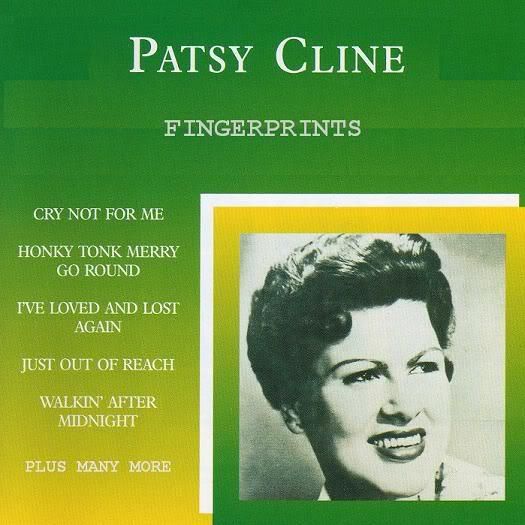
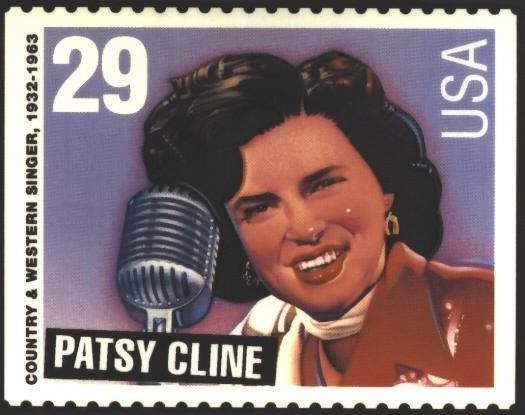
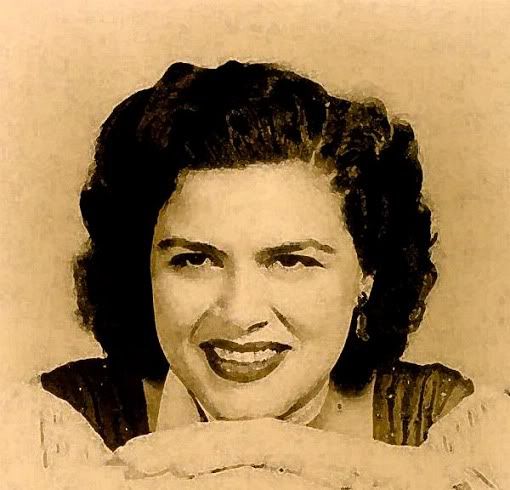
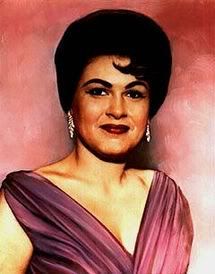
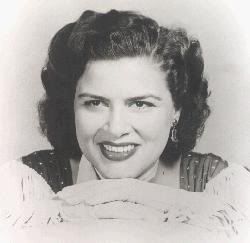
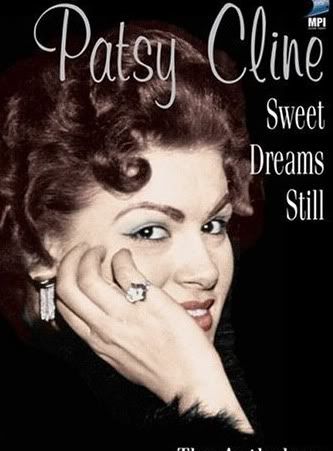
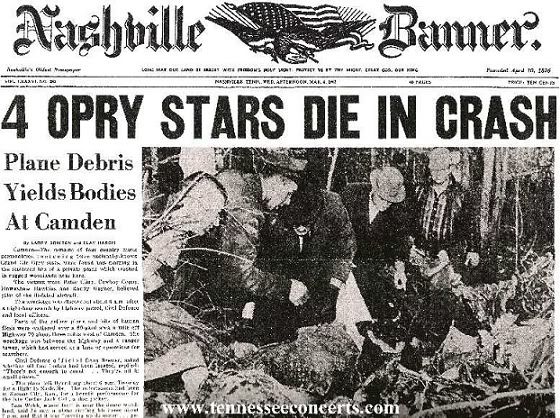
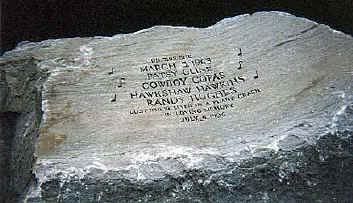


Nincsenek megjegyzések:
Megjegyzés küldése